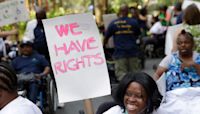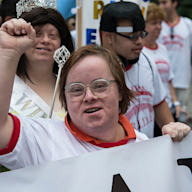Search results
Here is the text of the Americans with Disabilities Act of 1990 (ADA), including changes made by the ADA Amendments Act of 2008. Congress passed the ADA as a “Public Law,” and it originally was in a different format than presented here. To make the law more widely available, the ADA was later reformatted and published in volume 42 (called ...
- ADA 30th Anniversary - Standout Stories
The Americans with Disabilities Act (ADA) protects your disability rights. Learn where to ask ADA-related questions and how to file a complaint about discrimination or abuse.
The ADA is a civil rights law that prohibits discrimination against individuals with disabilities in many areas of public life, including jobs, schools, transportation, and many public and private places that are open to the general public.
The Americans with Disabilities Act of 1990 or ADA (42 U.S.C. § 12101) is a civil rights law that prohibits discrimination based on disability. It affords similar protections against discrimination to Americans with disabilities as the Civil Rights Act of 1964 , [1] which made discrimination based on race , religion , sex , national origin ...
Sep 9, 2008 · Facts About the Americans with Disabilities Act. The U.S. Equal Employment Opportunity Commission. Title I of the Americans with Disabilities Act of 1990 prohibits private employers, state and local governments, employment agencies and labor unions from discriminating against qualified individuals with disabilities in job application procedures ...
July 26, 2020 marks the 30th anniversary of the enactment of the Americans with Disabilities Act (ADA). Signed into law in 1990 by President George H.W. Bush, this landmark civil rights legislation increases access and opportunity for people with disabilities across community life, including employment.
The Americans with Disabilities Act (ADA) became law in 1990. The ADA is a civil rights law that prohibits discrimination against individuals with disabilities in many areas of public life, including jobs, schools, transportation, and many public and private places that are open to the general public.

















